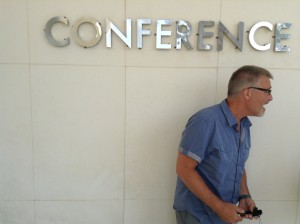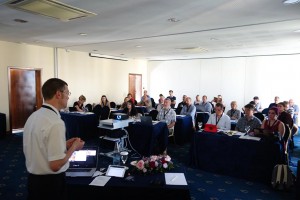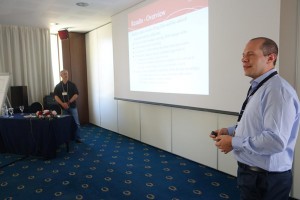
The International Conference on Information and Communication Technologies in Education (ICICTE) was held in Greece in early July, the first international conference held overseas I’d presented at. Here are ten reflections based on the experience that might be helpful for any other first time presenters at an international conference.
Contents
Submit a good proposal
The route to participation is largely through either a paper, a workshop, or a poster. My submission was a paper co-authored with a colleague (co-authoring being another first for me). I found writing with somebody else to be an effective way of bringing discipline to the act of writing, for bouncing ideas around, and for acting as an initial editorial filter. Make your submission interesting, useful, or topical. Give your audience something they didn’t have beforehand.
Be prepared
This can’t be stressed enough. I had slides fully completed in advance. Outline script prepared. Presentation rehearsed with the co-author. All of which meant being able to deliver the presentation with calmness and confidence, and being better prepared for the inevitable challenges that might happen outside of my control. It helped with pace too.
Consider what your slides will look like too – not too dense, good use of images, beware of cognitive overload. Try to limit the amount of ideas you present. You’ll want to share your findings from your extensive research, but it is more important to allow your audience to absorb the key points of your message than fit everything in.
Make friends
This helps you get the most out of the experience. If going alone, it gives you people to sit with during sessions, to share ideas with (during and after the conference), and some company during the social elements of the conference. And a conference that doesn’t facilitate networking opportunities can be a very empty one. The best conferences will recognise the value of a little ‘professional recharging’, and may even build social events into the conference programme.

Accept that the technology might fail
As a technologist, I know well that sometimes even the best prepared technology can fail at the point of delivery (as some of mine did). No matter how much you can prepare for these things, there will always be something outside of your control. Have alternative strategies in place and be prepared to be adaptable in the face of your audience. Make light of the problem and the audience will appreciate it – most people are likely to have experienced something not working as intended when presenting.
Stick to allocated timing
Everyone notices the presenters that overrun, and appreciates those that keep to time. It gives good grace to other presenters not to run into their time and helps the session facilitators keep things running smoothly. It also helps to practice with being concise in getting a message across.
Keep an open mind
According to the British media, Greece was on the brink of economic collapse at the time. Although this backdrop was ever present and the event was never likely to be a strong indicator of the wider issues, the conference ran as intended. Reference was made during the closing remarks to how appreciative the conference was that, despite this backdrop, delegates still came from all over the world and made it the successful event that it was.
Enjoy the experience
It was a lot of fun to meet people, professionally useful to engage with the ideas, and was held in a fantastic location. I even managed to relax a little too, which is always appreciated.

Go to other people’s events
About as important as being fully prepared, this one. Going to other people’s events can help build an audience for your own presentation and gives good grace to those that have put in the effort to contribute to the programme. It also gives you a broader overall picture of the conference topics or themes, and allows you to engage with more ideas, including ones different from your own.
Consider your answers
At some point, you’ll be asked about what you are presenting on. Think beforehand about the topics or issues that your talk might raise and how you might respond. I had two questions – one about the time it might take an academic to prepare for making better use of the affordance of a learning space, and the other raising the fact that their institution was about to undergo a radical estate change and was doing away with lecture theatres so wanted to share this with the rest of the audience. These gave me a sense of how my presentation was received and issues it raised from within the audience.
Take some time for yourself
This is about striking a balance and not overdoing it. Most conferences have fairly packed programmes of sessions to attend. Don’t feel that you have to go to all of them to get the most out of the event. Take a little personal time to recharge, go over your notes, rest up, or even explore the location a little further. Conferences don’t have to be 100% about the conference.


Wonderful piece, Dominic. Great tips that will make the life of potential contributors easier. I assure you, ICICTE 2015 was extremely happy to have you on board. Looking forward to seeing you again at ICICTE 2016.
Thanks very much Gorg – it was a pleasure to be part of this event! Looking forward to more engagement with this conference community 🙂
useful tips for first timers. Well done.
Thanks Gjoa. So, what tips would you add for first timers?